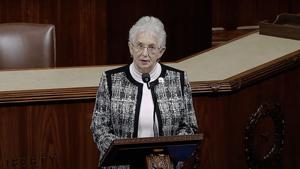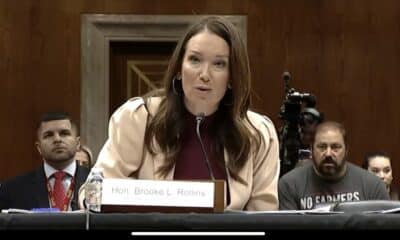(The Center Square) – As congressional Republicans struggle to find ways to reduce federal spending on Medicaid without affecting vulnerable people, some have eyed shifting part of the cost burden onto states.
To finance President Donald Trump’s expensive priorities laid out in the Republican $5.8 trillion budget reconciliation framework, which includes extending the 2017 Tax Cuts and Jobs Act, House committees must find varying levels of spending cuts in other areas of the federal government.
Energy and Commerce, the House committee that oversees Medicaid, must find $880 billion in spending reductions over the next ten years, or about $88 billion per year. Even though the bill does not specify where the committee must find the money, the Congressional Budget Office estimates that $581 billion of those savings must come from Medicaid.
Medicaid costs roughly $900 billion taxpayer dollars per year, with the federal government shouldering roughly two-thirds of that spending and state governments covering the rest.
With experts split on whether federal spending reductions in the program would necessarily harm state budgets and needy recipients would necessarily, the American Legislative Exchange Council is highlighting some successful state reforms that have lowered Medicaid spending.
ALEC Health and Human Services Task Force Director, Brooklyn Roberts, told The Center Square that the existing budget reconciliation activities provide a rare opportunity to “open up the hood” on Medicaid spending and sustainability, both on the federal and state level.
“States are the laboratories of democracy, and I think they can innovate and figure out ways to set up their programs and save money if we just give them the freedom to do so,” Roberts said. “We’re not really taking a position on what the reforms are going to look like at the national level; we’re focused on how the states can adapt to whatever happens on the federal side.”
Under the Biden administration, Medicaid spending shot up 20% and expanded program eligibility beyond low-income seniors; families with children; and pregnant mothers with their infants to able-bodied, childless adults. This means that even if Republicans find all $880 billion in savings via Medicaid cuts, federal funding to the program will still grow, just at a slower rate.
But given that most states have also expanded Medicaid eligibility – and many are now struggling under that burden – program reforms can help states adjust to whatever changes happen at the federal level.
“A lot of states, especially states that have expanded Medicaid, are facing these huge financial challenges trying to shoulder the full cost,” Roberts said. “It’s almost a third of most state budgets. So they need to be looking at what types of services they’re providing and then making sure that coverage is going to the people who truly need it.”
A large part of that includes identifying and preventing improper payments and fraud, she said.
“You’ve got Indiana, who just passed SB2, that is focusing on program integrity and making sure that the people who are on the program are the people who truly should be. That requires yearly eligibility verification, [and] it requires that those verifications are matched against federal databases, which are the strongest predictor of fraud.”
Besides simply rolling back Medicaid expansion, other cost-cutting options available include transitioning over to a managed care type of system, like Idaho is considering, or implementing work requirements for some recipients, like Arkansas is doing.
“Medicaid is not a permanent solution – it’s supposed to help people transition to private and other insurance,” Roberts said. “[States] need to be working at looking at the types of reforms that best fit their population.”
Americans are wary of any major changes to the program that more than 71 million rely on for healthcare coverage. The Center Square’s Voters’ Voice poll, one of only six national tracking polls in the United States, shows that the vast majority of Americans do not want any spending reductions to Medicaid.
This article provides a balanced report on the debate surrounding Medicaid spending, but it leans slightly to the right in its presentation. The content highlights the challenges faced by state governments in managing Medicaid costs, particularly in states that expanded eligibility under the Biden administration. It emphasizes the need for reforms, mentioning conservative-leaning organizations like ALEC, and features a viewpoint that states should have more flexibility to design their own Medicaid programs. The article also discusses cost-cutting measures, such as work requirements and managed care, which align with conservative policy preferences. However, it avoids explicitly advocating for any particular reform, presenting multiple perspectives without overt bias toward one side. The use of expert testimony from Brooklyn Roberts, a director at ALEC, further tilts the narrative toward conservative viewpoints on Medicaid. The piece refrains from deeply critical language about potential Medicaid cuts, focusing instead on how states might cope with federal changes.
















































